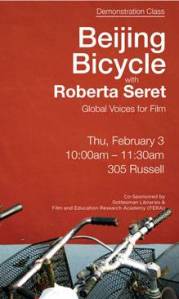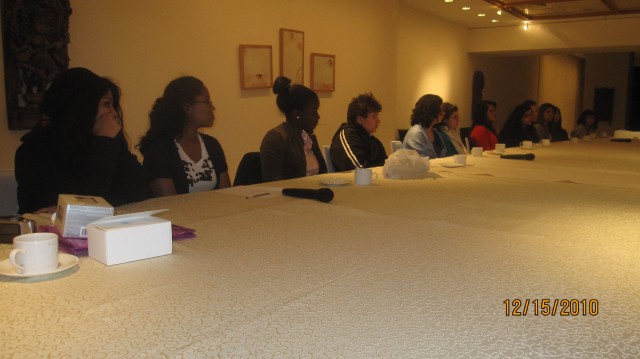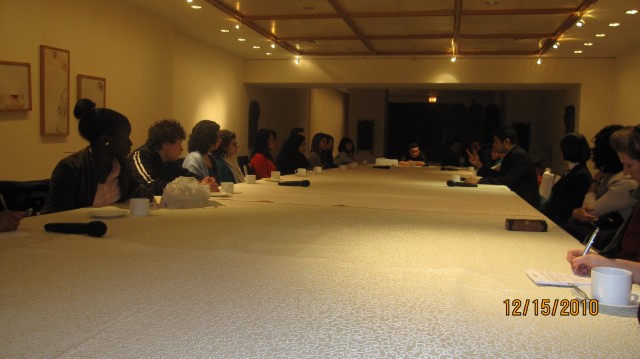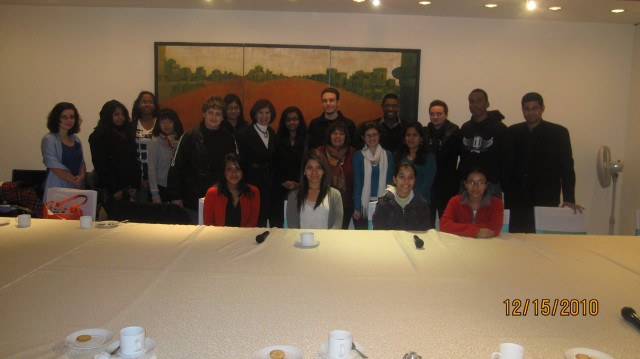Screening at the United Nations: Not One Less (China)
United Nations Class – Teaching Diplomats English

Dr. Roberta Seret Teaching ESL with Film
Briefing, Tour of the United Nations, and Screening of FILMed – Saudi Arabia
Longwood Junior High School, Patchoque, NY
Moundville Native American Festival, Alabama
Our very own Kristina Kirtley particpated in the Moundville Festival as part of the Chickasha Hithla Dance Troupe.

Persepolis Screening – Global Hotspots Film Festival
High School for Art & Design
UN Diplomats Global Classroom
United Nations and European Union Mission Visit

United Nations and German Mission Visit
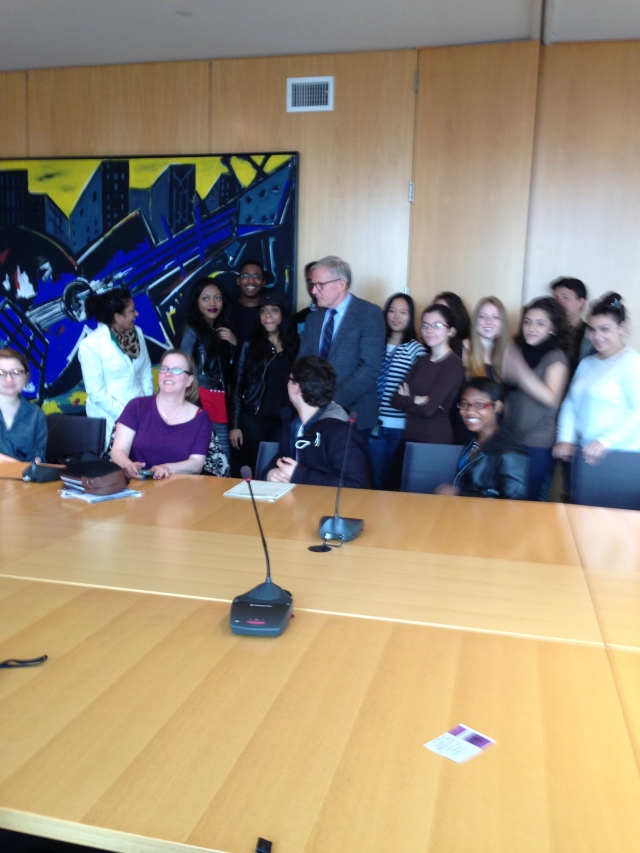
Morgan Stanley Economics Seminar
Academy of American Studies and High School of Art & Design

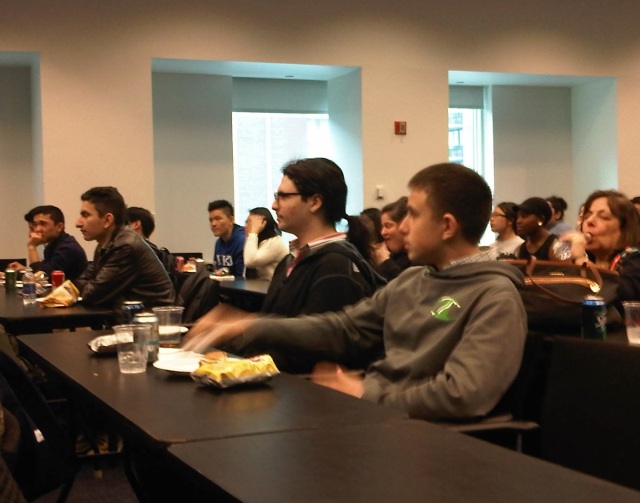
Peer Leaders in New York City from Lake Wales I.B. High School, Florida,


Screening of Student Films at the Tolerance Center Museum
New York, October 26, 2011
Students produced PSAs and short documentaries as part of our Student Produced Film Screening Event at the Tolerance Center Museum. Participants included visiting Cherokee students from Sequoyah High School (Oklahoma).
Pray the Devil Back to Hell
Produced by Abigail Disney
[Screening held at the United Nations]
Dear Dr. Seret,
I cannot begin to thank you enough for inviting us to see Pray the Devil Back to Hell. It was a profound and moving experience and Abigail Disney was absolutely stunning in her presentation.
Your International Cinema Education program is extraordinary and will ensure that the students who participate will be prepared to be the global citizens we need to lead us forward into the 21st century.
If there is anyway I can help you with the program, please let me know.
Once again, I thank you for an amazing experience.
Best,
Karen Andronico
Lehman High School
Hi Roberta,
My students and I would like to thank you very much for giving us the great opportunity of visiting the U.N. and watching the documentary “Pray Them Back to Hell.” My students were moved and I believe forever changed because of the great and positive impact this documentary provided for them.
We realize the amount of work that goes into organizing a program such as this, and we would like to greatly thank you. We look forward to participating in other programs such as this.
Thanks again,
Teresa Matthews
Pearl Screening and Reception
[Screening held at the United Nations]


I.C.E. students with Governor Bill Anoatubby, leader of the Chickasaw Nation at the National Museum of the American Indian
Check out an article about Ashley in the Chickasaw Times:
http://digital.turn-page.com/issue/28532
_____________________________________________________
Demonstration Class
Video of event: http://blip.tv/play/hpMhgqOdYwA
A demonstration class serves to model successful teaching and learning practices, in innovative and creative ways and, increasingly with the use of thought-provoking media. Enter Roberta Seret, Founder and President of International Cinema Education. Dr. Seret’s organization offers a wide range of highly engaging, multidisciplinary programs, among them, Global Voices for Film, consisting of lectures and screenings of 10+ foreign films shown in partnership with local and regional high school classrooms; post Q & A discussions, with members of the United Nations and Morgan Stanley volunteers; a tour of the United Nations, with private briefings at Foreign Missions; and a workshop on human rights at the Tolerance Center.
On Thursday, February 3rd, Dr. Seret will lead a class at Teachers College for junior high school students, ages 12-14 years, from Patchoque, Long Island. The first half an hour will be shown of Beijing Bicycle, a film that questions China’s transition into a Super Power, followed by a lesson plan, and Q&A. In this film, the director focuses on two seventeen-year-old boys and their relationship centered on a bicycle, the symbol of China. Both boys are of different social status; they yearn for acceptance within their group and are stubbornly determined to succeed – with surprising results. Viewers, especially young adults — wherever they are– can relate to a stolen bike, and understand the importance of a bicycle for both pleasure and business.
Roberta Seret holds a doctorate in Comparative Literature and Master’s in French from New York University and has taught literature and writing on the university level for many years. She directs an NGO under the aegis of the Department of Public Information at the United Nations. She is also Director of Professional English at the United Nations, where she teaches English language, literature and business. Roberta Seret has published:Welcome to New York, 5th ed. (1st ed. Harper & Row); Voyage into Creativity: The Modern Kunstlerroman (Peter Lang, 1992); “A Picture is Worth a Thousand Words,” (Spring, 2004), United Nations Chronicle; “The United Nations as a Global Classroom,” (Spring, 2006), United Nations Chronicle; and World Affairs through Foreign Films: Getting the Global Picture (McFarland, October 2011).This in-press book spans Asia, Africa, South America, Antarctica, Europe, and North America, with film synopses; historical background; pre-and post- screening questions; curriculum themes; suggested multidisciplinary activities; extra curricular activities; sidebars, public responses, and information on actors, directors, and awards; and bibliographies of further global study resources/films pertinent to each country covered.
Ms. Regina Casale, Longwood JHS Spanish teacher and a current Teachers College doctoral student in Interdisciplinary Studies, is engaged actively in curriculum innovation with a global context. In collaboration with FERA and Long Island Latino Teachers Association, Ms. Casale received a grant from the Kellogg Foundation: America Healing Initiative which funds her Life through My Eyes project transforming students of Saxton JHS into advocates for human rights, using film. These students will also be joining Ms. Seret in March for the screening of Pearl; a Q&A; and a tour of the UN.
After the demo class for Bejing Bicycle, Ms. Casale will be joined by Robert Branch, a Dominican-American art educator and videographer from the Bronx. They will conduct a second workshop entitled, Camera Grammar. Robert Branch a long-term participant of the Tim Rollins and K.O.S. (Kids of Survival) art collective. He holds a bachelor’s of Fine Arts degree from The Cooper Union and a master’s degree in Instructional Technology and Media from Teachers College, Columbia University. He is a former public school art teacher and currently works for Columbia University. His research interests include, but are not limited to, collaborative social learning spaces and low budget and experimental filmmaking.
Individuals with disabilities are invited to request reasonable accommodations including, but not limited to sign language interpretation, Braille or large print materials, and a campus map of accessible features. Address these requests to the Office of Access and Services for Individuals with Disabilities at (212) 678-3689, keller@tc.edu, or Deaf and Hard of Hearing Services at (212) 678-3853 V/TTY, jaech@tc.edu.
http://library.tc.columbia.edu/news.php?id=665
______________________________________________________________________________________
Mission of India Visit
Briefing by Vinod K. Jacob (First Secretary/Mission of India)
_______________________________________________________________________________________
Oklahoma Visit
Chickasaw Nation and The Chickasaw Cultural Center (Sulphur, OK)

Kristina Kirtley, Dr. Roberta Seret, Dr. Amanda Cobb-Greetham, Shelly Miller, Jeannie Barbour, Tony Choate
Dear Weinstein Company and Dr. Seret,
I want to thank you profusely for allowing my AP English Literature class to come and see the sneak preview of the film “Nowhere Boy” at the Tolerance Museum on September 22, 2010. It was an incredible experience for all of us, myself included. I’d like to share some of our experiences that day, that you may or may not have known about:
When we left Astor Collegiate Academy at 9:15 that morning, I was already concerned that we were getting a late start, since the movie was slated to begin at 10am. Unfortunately, our students had been held up at scanning–each morning, they are required to go through metal detectors and pass their bags through scanners upon entry–and it did not seem fair to leave them behind due to our security’s slowness. So here we were, exiting the building a full 30 minutes later than I’d planned. We got to the Pelham Parkway subway station, at which point I presented our NYC Board of Education/MTA Transportation pass…only to find out that it was invalid until exactly 9:30am. This was a problem no one in our school had ever encountered; indeed, when I called our principal to ask her to intercede on our behalf, her response was “What?!?!? Oh, good grief.” Her efforts to charm the station agent into letting us through were ineffective, and train after train passed us by before 9:30am, at which point the agent signed off on our pass, so laboriously and slowly that we missed yet another train in the time it took her to give us a signature.
Once on the train, I was quite panic stricken–I feared that the film would start without us, and the entire trip would be for naught. Never ones to miss an opportunity for fun, my students decided to play a little trick on me. I received a call from an unlisted number on my cell phone. The person at the other end said “Hey, when are you guys getting here? I need to start this movie.” I was shocked–we’d already called the Tolerance Museum to tell them of the snafus we’d been facing! “Please let me speak to your manager right away,” I said to the person at the other end. I waited for a second while the “manager” came on the phone, and he said, “Yeah, no problem–we’ll hold the movie for you.” During this conversation, I could see that the students were surrounding me in my seat on the train, but I was so preoccupied with the call that I didn’t notice until one of them tapped me on the shoulder, and I realized it was he that I’d been speaking to the whole time! We all got a good laugh out of that; I think there’s a video of the “punking of Ms. Garon” on facebook.
Thankfully, we arrived at the Tolerance Museum at 10:30am, and were relieved to find that Dr. Seret had been kind enough to hold the film for us. Our students eagerly piled into their seats, and the show began.
Initially, I could tell that the kids were confused: the actors’ English accents were throwing them off, and the movie’s sexual undertones were, I could tell, shocking to some of them. But within several minutes, they were engaged in the film. Periodically they would tap me on the shoulder to ask me questions (“Is this true? Did it really happen this way?”), but for the most part they were completely focused. I heard some of them expressing their approval–stage whispers of “Damn, I’m love this movie! I’m gonna buy it the minute it comes out on DVD!”–and they laughed continuously at the movie’s comedic parts. During the more dramatic, emotional events later on, such as the death of John Lennon’s mother, they were completely silent, save for an unmistakable sound of sniffling. (They later took a poll about who cried at the end of the movie–apparently, most of them did.)
When we debriefed about the film, the reaction was overwhelmingly positive. One student, a tough kid who immigrated from Jamaica in 10th grade, lives with his aunt, and never knew his father, summed it up like this: “The movie taught us that even if you have obstacles in life, you have to overcome them in order to achieve your goals.” That was the message most of the kids took from the film; one of them, an aspiring musician whose parents are deceased, turned to me at one point on our subway ride home and said, “Man–that movie was about my life.”
His remark simultaneously saddened and heartened me. On the one hand, I was reminded of why John Lennon’s young life–one that, from my perspective, seemed difficult and sad–was so resonant with the students; indeed, Lennon’s life is similar to many of theirs. On the other hand, my confidence that our students will overcome their obstacles and make something of themselves (just as they said themselves) is bolstered by having witnessed the inspiration they derived from the film.
For kids in a tough, inner-city school, seeing this film meant the world. Not only were they encouraged by John Lennon’s struggle and success, the sheer fact of having been invited to see this film at the Tolerance Museum, of having been “selected” for something special, really kicked off their AP English experience with a positive start. This experience showed them that sometimes even things that are “educational” (a word they inevitably pronounce with distaste) could be fun, and that thinking about the important questions–where do we come from, and where are we going–can lead to inspiring and hopeful realizations.
I’d like to thank you again for giving us this tremendous opportunity. We hope to participate in more programs at the Tolerance Museum in the coming months.
All the best,
Ilana Garon
ACA English Department













